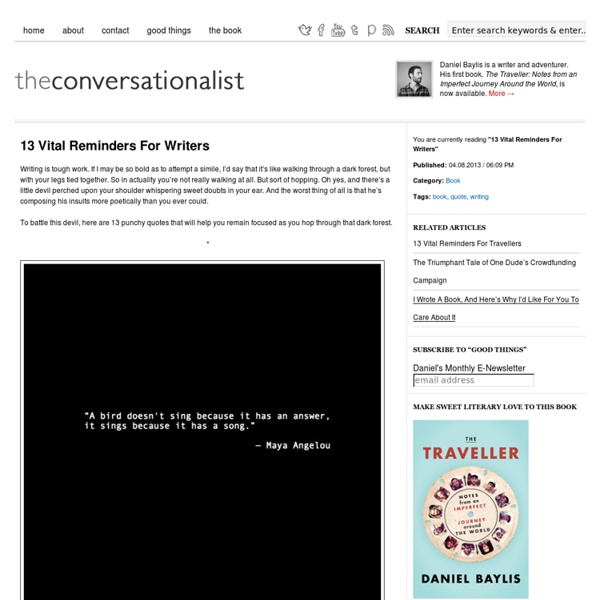



http://www.danielbaylis.ca/book-2/quotes-for-writers/
How to Structure A Story: The Eight-Point Arc By Ali Hale - 3 minute read One of my favourite “how to write” books is Nigel Watts’ Writing A Novel and Getting Published. My battered, torn and heavily-pencil-marked copy is a testament to how useful I’ve found it over the years. Although the cover appears to be on the verge of falling off altogether, I’ve risked opening the book once more to bring you Watts’ very useful “Eight-Point Story Arc” – a fool-proof, fail-safe and time-honoured way to structure a story. (Even if you’re a short story writer or flash fiction writer rather than a novelist, this structure still applies, so don’t be put off by the title of Watts’ book.)
9 Editing Tips that Make Your Writing Sparkle It’s often said that writing is rewriting. Banging out a quick first draft can be fun, but the real grunt work comes in revising your work. Here are nine editing tips that can help you polish your writing until it sparkles: 1. 10 Writers Every Man Should Read As you head out for the beach this summer, pack a book that’s packing some testosterone. Everyone knows London, Hemingway, Mailer, Thompson, Krakauer. Here are 10 other manly authors whose powerful prose will practically put hair on your chest. And we’re pretty sure all these dudes would advise against waxing it. —Nicholas Pell onism The Dictionary of Obscure Sorrows is a compendium of invented words written by John Koenig. Each original definition aims to fill a hole in the language—to give a name to emotions we all might experience but don’t yet have a word for. The author's mission is to capture the aches, demons, vibes, joys and urges that roam the wilderness of the psychological interior. Each sorrow is bagged, tagged and tranquilized, then released gently back into the subconscious.
How to Write a Book In Your Spare Time Many people say they would like to write a book. That statement is usually in the form of “I have this great book idea”, “I’ve always wanted to write a novel” or “I will write it when I have more time.” I used to say things like that. I kept promising myself that I would write a book someday. Then I realized something important. There are seven days in a week, but someday isn’t one of them.
Writer’s Digest - Writing Prompts Write a scene that includes a character speaking a different language, speaking in a thick accent, or otherwise speaking in a way that is unintelligibe to the other characters. (Note: You don't necessarily need to know the language the character is speaking—be creative with it!) Describe a character's reaction to something without explaining what it is. See if your fellow prompt responders can guess what it is. Write a story or a scene about one character playing a prank on another.
Free books: 100 legal sites to download literature The Classics Browse works by Mark Twain, Joseph Conrad and other famous authors here. Classic Bookshelf: This site has put classic novels online, from Charles Dickens to Charlotte Bronte.The Online Books Page: The University of Pennsylvania hosts this book search and database.Project Gutenberg: This famous site has over 27,000 free books online.Page by Page Books: Find books by Sir Arthur Conan Doyle and H.G.
The Ultimate Guide to Writing Better Than You Normally Do. Writing is a muscle. Smaller than a hamstring and slightly bigger than a bicep, and it needs to be exercised to get stronger. Think of your words as reps, your paragraphs as sets, your pages as daily workouts. Think of your laptop as a machine like the one at the gym where you open and close your inner thighs in front of everyone, exposing both your insecurities and your genitals. Because that is what writing is all about. How to Find Unique Names for Your Characters Steps Method 1 of 2: Finding Your Own Unique Names 1Use a first name as a last name. Since first and last names usually sound very different, breaking this tradition would make your character stand ever so slightly apart.
50 Strategies For Making Yourself Work Written by Jerry Oltion Copyright © 2001 by Jerry Oltion Work avoidance is one of the major paradoxes of the writing profession. Generally, writers want to write (or want to have written), but all too often we find ourselves doing anything else but. We’ll mow lawns, do the dishes, polish silverware–anything to keep from facing the blank page. At the same time we know we eventually have to get to work, so we come up with all sorts of strategies for forcing ourselves to the keyboard.
Top 10 Best Novels of the Last 20 Years Books The ten novels on this list all substantiate the belief that books are the most elastic, introspective, human and entertaining form of media that exist. Not movies, not music, not art, not the theatre. A famous author once said that novels are the best way for two human beings to connect with each other. Free books: 100 legal sites to download literature The Classics Browse works by Mark Twain, Joseph Conrad and other famous authors here. Classic Bookshelf: This site has put classic novels online, from Charles Dickens to Charlotte Bronte.The Online Books Page: The University of Pennsylvania hosts this book search and database.Project Gutenberg: This famous site has over 27,000 free books online.Page by Page Books: Find books by Sir Arthur Conan Doyle and H.G. Wells, as well as speeches from George W.